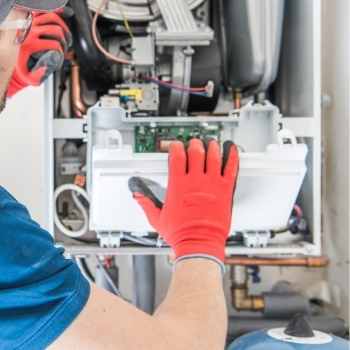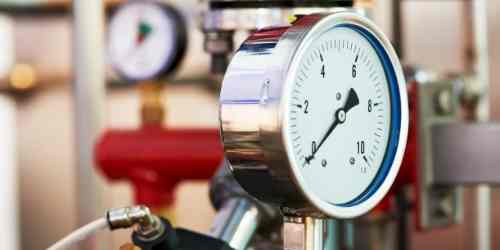Cleaning your heating system with vigorous and mobilizing agents is a great way to eliminate sludge, lime, and other deposits in your house. Also referred to as "hard flashing or jet flushing," power flushing is a process that uses water and cleansing agents powered through high velocity and low pressure to prevent damage to any system. The central heating system is done at high velocity to ensure that no lime or corrosion debris is left to create blockages in the system.
If your power flushes the unit, water is dispatched through your central heating system at a high-pressure momentum to dislodge any proliferation of sludge and debris. It helps boost the lifespan of the boiler and the effectiveness of the central heating system. The best way to configure your central heating system in shape to prevent further breakdowns is through consistent maintenance.
Suppose you fail to undertake these troubleshooting steps that aim to remove sludge, rust, and debris; the results are never a good thing. Failure to maintain your central heating system consistently would not only lower the system's flow but cause blockages. It will lead to inefficiency in the overall heating of thermostatic radiator valves.

Before the power flushing process, your engineer has to inspect the central heating system first.
For your system boiler, our heating engineer will attach the pump via the circulation pump, and for a combi boiler, he or she will attach the pump via the pump head. The pump will then convey the toxic mixture of chemicals into the central heating network at high pressure.
The cocktail of chemicals we use consists of:
The water plus the deposits and chemicals are flushed from the system and replaced with clean water and more chemicals.
A typical power flush comes to completion almost after a day. The number of hours ranges from one system to another according to the:
Moreover, your power flush should consist of a full installation of radiators, pipework, in addition to a complete boiler installed.


Depending on the number of radiators and the size of your property, the cost of power flushing varies. Radiator chemical flush costs vary depending on your location and the type of flushing company you choose. Power flush costs are higher in cities, towns, and densely populated areas. Large companies and corporations will be charged highly compared to smaller businesses.
For instance, if you have a two-bedroom home having six radiators, the engineer will charge a typical less fixed price. However when you have a four-bedroom home having fifteen radiators, the engineer will charge a higher fixed price. Since the property is large, an estimated period for completion between one to two days is expected.

If you need a heating engineer to get your job done, bear in mind to select a certified one. Our heating engineer charges are cost effective for an hour. Central heating power flush requires expertise for an engineer besides basic knowledge. We offer free price quotes, and our power flush costs are affordable; feel free to contact us.

When should you get a system power flush? Powerflushing is always recommended when the system is blocked or heavily contaminated. If your system was not accurately fitted and cleansed, then a power flush is required.
If your engineer is installing a new boiler, you should follow the boilers' directives to enable its long-term protection. Power flush enables the system to remove debris. Below are details about signs your system needs a power flush:

Typically, a power flush should not take you more than half a day and should not yield to other problems later. However, power flushing ranges from house to house, five hours for a vented three-bed house. If the house is sealed, less time is needed for the combined boiler system as there is no need to cap the expansion piping.
If you want to maintain your system in tip-top shape, then power flushing every 4 to 5 years is a worthwhile idea. In addition, you should be able to do away with power flushing your central heating system every 8 to 10 years based on the quality of the material you use in your system.

Just after performing a power flush, you will observe the benefits. Any unusual gurgling noises from the pipework will come to an end. Your water heats up faster than usual and will flow more uniformly.

When we install a new combi boiler, the general rule of thumb is every 4-5 years. There is no need to wait to renovate a power flushing pump if it fails within the recommended four years if it fails earlier. However, if your domestic heating system shows any of these signs, then you need to perform a deep clean power flush which prevents corrosion and will remove limescale:

Maintaining the central heating system is a constant power flushing process that shouldn't take a lot of your time to keep the system working throughout the year without breakdowns. It is not only a task for our boiler engineers but yours too. However, if your boiler breaks, then it's the responsibility of the engineer to install a new boiler.
We constantly sustain domestic central heating system for our clients annually to prevent boiler malfunction by following the steps below:
When you switch on your central heating system, inspect whether they are warm or cold. If you have cold radiators, this indicates your system is not operating effectively. Cold patches might be of less interest, but later, you will incur dispensable expenses. We can fix easily the cold patches at early stage, don't wait up so long to call us if such issues come up.
Insulating your pipes and cylinders is an eco-friendly way of saving energy. Lagged pipework enables water running in the plumbing system to remain hot even if the surrounding environment is cold. Lagging is not only affordable when it comes to costs on your energy bills but prevents pipes from freezing. With this, the central heating system works efficiently without hassle.
Automatically we can set your timings so that your boiler can work if you want it to, and it is switched off when you don't need it. A boiler continually running is probably going to break because of overheating. Always you can turn off your boiler as it can withstand being switched on and off several times a day.
We promptly stabilize build up water pressure systems at one bar or slightly above one but below two. The readings are typically stipulated on to the pressure gauge. If your domestic water system pressure is above or below the illustrated safe levels, your boiler may drop the pressure leading to a complete shutdown. Dealing with water supply pressure gauge systems might be challenging but if you contact our team we will show up immediately.
Blue pilot light is the safest way to burn the gases as it indicates complete combustion making it produce less or no soot. However, burning with yellow and orange flames might seem cooler, but toxic gases are released due to incomplete combustion. We always revist flames before starting burning; if it's blue, there will be efficiency when burning the gases.
For any rooms where gas appliances are set up, we install carbon monoxide and smoke detectors. Despite how the boiler is conserved, it is recommended that the only way to disclose odourless and colourless Carbon Monoxide is to fit a Co alarm.
In addition, our engineers also fit smoke detectors on every channel where electrical appliances are installed on your premises. Always seek professional help from our websites if things get worse.
Information to be placed here soon!
Information to be placed here soon!
Information to be placed here soon!